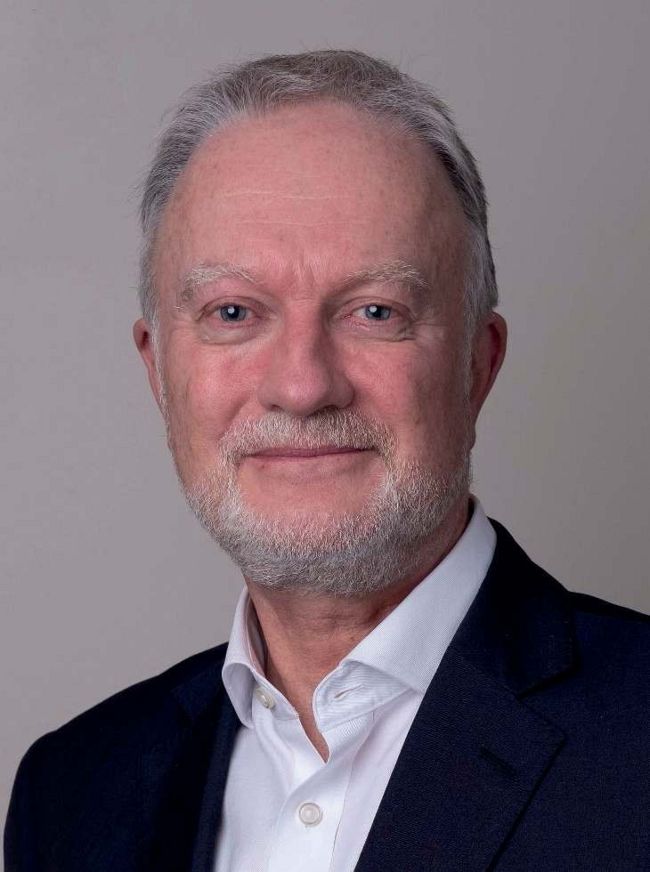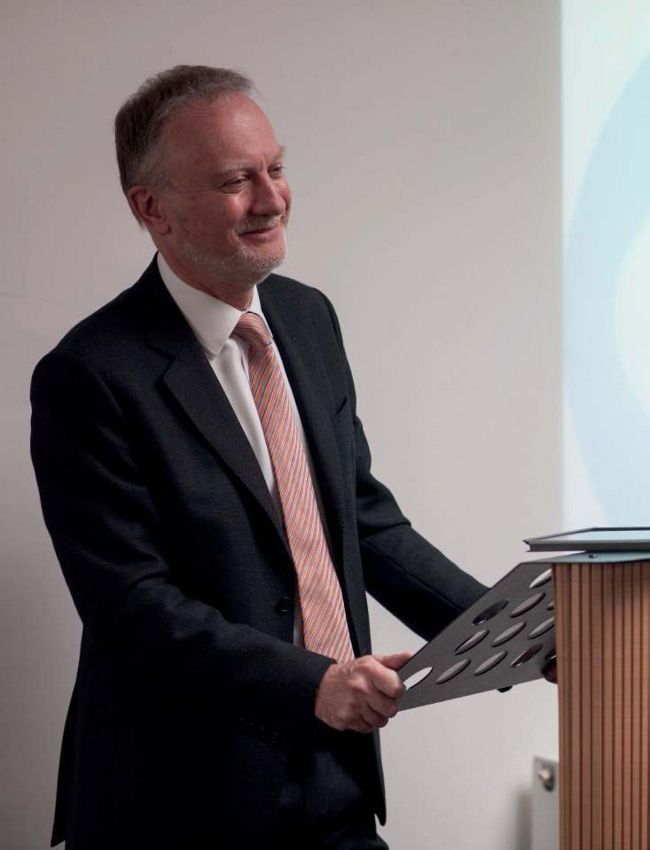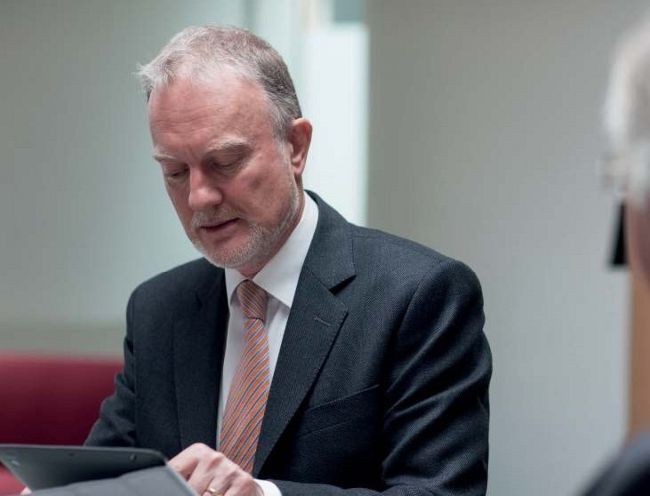’My life was changed’
Jackie Macadam learns about the life and faith of John Sturrock QC and how he was called to serve through mediation.
“Do nothing out of selfish ambition or vain conceit. Rather, in humility value others above yourselves, not looking to your own interests but each of you to the interests of the others” (Philippians, 2. 3-5)
“ONE of the real privileges of my career has been to work with John Chalmers (Moderator of the General Assembly of the Church of Scotland in 2014/15) and others in helping the church in South Sudan to learn more about mediation and conflict skills.
“That country has been torn apart by civil war since gaining its independence in 2011 and the church there has an important role to play in trying to find a way forward. We’ve run two training courses in Nairobi, Kenya, for South Sudanese church leaders in recent years and Place for Hope has now taken up that mantle.
“I also had the privilege of working with Ken Ross, when he was Secretary of the Board of World Mission, in Malawi, as we sought to ease the tensions within groups in the CCAP, the Church of Central Africa Presbyterian, in the mid 2000s.
“I recall the last day of one visit, when we had everyone sitting in a large circle in the plenary room, summarising what we would take away, and the apparently least empathetic participant over the three days expressed the view that love was the most important thing. We didn’t need to say more.”
John Sturrock QC is talking about his life and his work in mediation, and the beginnings of the project ‘A Place For Hope’, and how the lessons he has learned over 20 years of mediation have helped resolve differences at home and across the world.
“I was born in Stirling. I grew up there and lived in the same house for 15 years and it was quite a shock to move at that age when my father received a promotion to bank manager in a small town in the East Neuk of Fife. In Stirling, my primary school was a short walk away and high school was just over the wall. Looking back, life was relatively simple. It was the sixties and we spent a lot of time outside, went off cycling around the area without concern, played football most evenings after school and got caked in mud – and life was quite sheltered. My first exposure to the more complicated side of life was on my early morning paper round in 1972 which required me to visit wards in Stirling Royal Infirmary, where I sold not only newspapers but cigarettes. From the basic Embassy Regal to the grand Benson and Hedges in a gold box.
It was an eye opener. I remember the geriatric wards in particular and old ladies shorn of all dignity. And I had to learn to engage with all sorts of people I had not come across before.
“In Stirling, we attended Allan Park Church where I was baptised. The amiable (as I recall) Sandy Houston was the minister. My father became the Treasurer. My mother was in the Young Women’s Group. We sat in our named pew upstairs and my father insisted I wear a tie.
“That was a source of tension each week.
“In Sunday School, we learned, off by heart, the books of the Bible from beginning to end with dear Miss Muir. It took us weeks. I don’t think we discussed the contents much, if at all. I certainly don’t recall really learning much about the real Jesus. But I am sure that the caring teachers did their best with what was expected in those days.
“My recollections of Church are that it felt fairly austere. And yet, it gave me a grounding without which, I suspect, I would have little church connection today.
“My primary school teachers were a mix of old school (from Mrs Graham, with her grey hair tied in buns and the edge of a ruler on the knuckles for any transgression – still the best teacher I ever had) to sixties youthfulness and modernity (Miss Curtis, with a Lulu hairstyle). I recall Miss MacAndrew crying when she heard of Bobby Kennedy’s assassination.
“There was the embarrassment of being moved to the desk at the front of the room, to sit with the less intellectually able pupils, I am sure now to teach me a lesson in humility. And I still hurt to think about mis-spelling ‘excellent’ (with an ‘a’) and coming second in the spelling test as a result. These things reflect deep needs, I suppose, and I recall my mother sending me out to a school exam with the words: ‘Just do your best’. Doing my best became a key driver in my life. Perhaps it became a need to be the best, with all the pressure that brings.
“In Fife, another experience was equally formative – working as a barman in the Royal Hotel in Anstruther. Serving a pink gin at one end of the bar and a rum and half pint at the other exposed me to all sections of local society. I had to learn to communicate with anybody and everyone. I can still tell you the prices of the drinks if you ask!

John Sturrock QC
”I could see how I could help people solve their disputes and di erences in a co-operative and constructive way, where they could really understand each other, relationships could be renewed and their real needs could be recognised.
“I went to Edinburgh University to study law, and, after one or two other diversions, joined the Faculty of Advocates in 1986. I enjoyed life at the Scottish Bar immensely and the cut and thrust of legal debate in court in particular. Hours spent on esoteric legal argument satisfied me intellectually.
“However, I became increasingly aware of what felt like a disconnect between that adversarial, win/lose, world and, when I thought about it, what I understood the Gospel message to be. Without being pious, I had a sense of wanting to do something that fitted better, where I could make a difference. I got into professional training in the 90s as the first Director of Training and Education at the Faculty of Advocates. We inaugurated a world-leading advocacy skills programme, here in Scotland. I came to appreciate the need to value and encourage people in a training and learning context.
“In 1996, I trained in what is called ‘interest-based’ (win-win) negotiation at Harvard University, under the great Professor Roger Fisher, co-author of the seminal book, Getting to Yes. Incidentally, the other co-author, William Ury, addressed the chamber of the Scottish Parliament in May last year at my invitation, the highlight of my professional career, especially as the First Minister gave the response speech. Anyway, the lights came on.
“A few weeks later, in 1996, I undertook training as a mediator and my life was changed. I could see how I could help people solve their disputes and differences in a co-operative and constructive way, where they could really understand each other, relationships could be renewed and their real needs could be recognised. Value one another, see others’ interests as important as your own, do not judge, be aware of the speck in your own eye, get into the other person’s shoes. And so on. These tenets of mediation all resonated with me.

“I made the defining choice of my career: to leave the law and begin a career as a mediator and conflict resolution specialist. For me, in I hope a humble way, that has enabled me to do something which fits more closely with what I understand to be Jesus’ radical call. But I don’t want to denigrate what others do – this simply suited me. And much of the time, I am just doing my job. Occasionally though, I will be privileged to have an almost spiritual experience when a hitherto apparently unresolvable dispute is overcome or a broken relationship is renewed and lives and businesses and communities experience real change. I believe that the work of mediators is profoundly important and central to restoring healing and reconciliation where it can be most needed. We need much more of this in our often broken society in the secular and political worlds, as well as in our religious institutions.
“Looking further back, though I had retained a strong faith, I pretty much rejected the church as an institution from my late teens and only rediscovered church in Philadelphia in 1984 when my wife, Fiona and I lived there while I was studying for a Masters degree at the University of Pennsylvania.
“Fiona and I were married earlier that year and one day we decided to attend a local church in Philadelphia, just a block away from our apartment. We were embraced by the preaching of the Rev Ernest Somerville, a disciple of George Macleod in Govan. Ernest was said to be one of the finest preachers in the United States. He befriended me that year, we had regular Thursday morning conversations in his vestry when I might have been at my classes, and I joined the church on Maundy Thursday in 1985.
“Studying in the USA shaped me in many ways. I learned about another system of law and way of life. I met people from around the world in my LLM class. It gave me a grounding, an awareness of a world beyond Scotland. That led me to engage with Americans in the field of advocacy training in the mid 90s and then to go to Harvard to learn about negotiation. I felt comfortable working with Americans and, in the field of mediation, that country has been a principal source of inspiration to me. Many of my closest mediator friends are from that country.
“On our return to Scotland we became established at Mayfield (now Mayfield Salisbury) Church in Edinburgh for a number of years, with the wise and humble Bill McDonald as our minister and indeed baptiser of two of our three children. I was ordained as an Elder there. We now worship at Liberton Northfield, our local church.
”But my relationship with the church as an institution and with organised religion has remained an edgy one. I have found great comfort and much insight in deeply exploring aspects of faith and spirituality, especially in recent years through the works of such as Richard Rohr, Brian McLaren, Rob Bell, Marcus Borg, John Shelby Spong, Ilia Delio and others. I have sought to understand who the radical Jesus really was and what he means today. I suppose you could say that has inspired me in much of what I do professionally.
“Returning to Place For Hope, that really came about after many conversations with John Chalmers!
“John and I used to meet for coffee regularly and chew the fat, particularly about conflict in the church (John had trained with my company as a mediator as did so many senior Church figures in the early years of this millennium). I recall one day walking past St George’s West and thinking how wonderful it would be if we could create a churchcentred conflict resolution or mediation initiative. It seemed that Church procedures for dealing with conflict were often based on a Victorian idea of criminal law. More than that, there were big issues out there, such as same sex marriages, which would need very sensitive handling. I am sure others had thought about all this before but that moment resonates with me for some reason. Anyway, John and I would talk about the idea and from those conversations arose the excellent and ground-breaking Aviemore conference in 2009, organised by John and his team. I gave the opening address and my good friend from California, international mediator and one of the wisest people I know, Ken Cloke, gave the keynote address. As Ken would tell us, ‘there is no us and them, only us.’
John, was a real visionary in this as was John Christie when he was Moderator, and with colleagues John came up with the name Place for Hope to take forward the initiative. We trained another 40 or more ministers as mediators shortly after that. “The idea gained momentum from then on. The rest, as they say, is history – or at least contemporary studies! There is such a need for churches to be places of and for hope, where mediators (and others simply being there to act as sounding boards, listening ears) can help folk to work out how to deal with difficult situations, not just in church communities but more widely. It is surely one of our callings.”
“It is sad when people cannot be liberated from the antagonism of a dispute. We know that our brains are designed to protect us from danger and, too often, that protective mechanism leads to a fight or flight response when we actually need to stop and reflect and change course.
“I suspect Jesus understood all of this 2000 years ago. He had such an insight into our humanity and why we struggle. That is why I sense that a deep understanding of what Jesus really offers to us, without being constrained by the conventions and dogma of religiosity, is so important to us now.”

”There is such a need for churches to be places of and for hope…